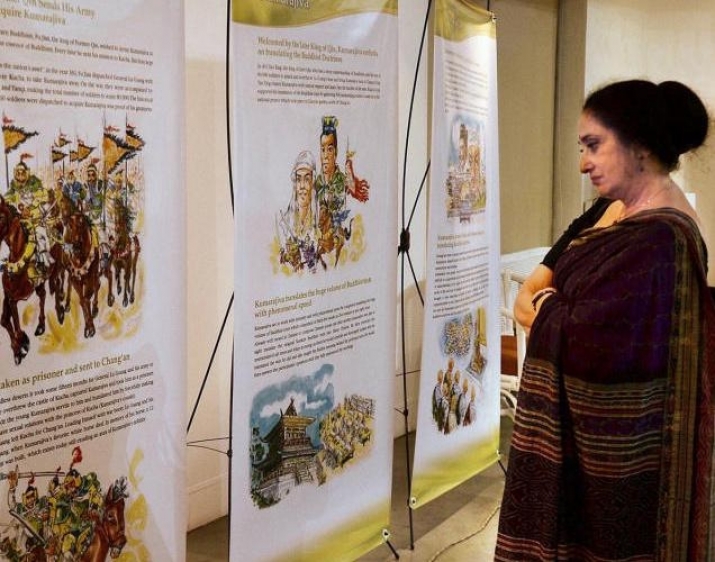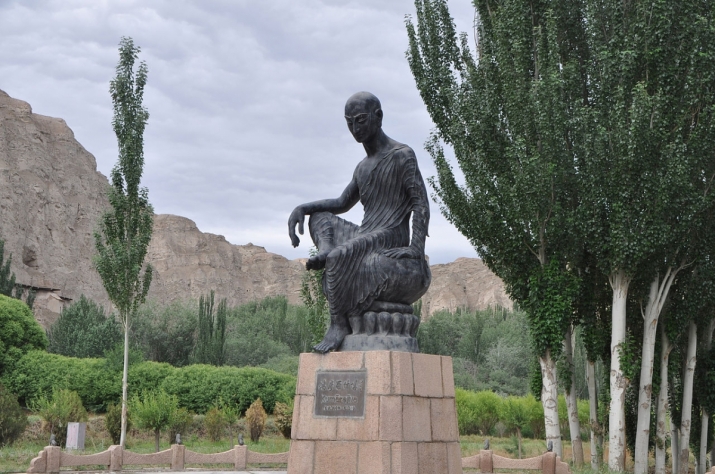NEWS
India International Centre Hosts Exhibition Commemorating Kumarajiva
 The Life and Legacy of Kumarajiva exhibition at the India International Centre in New Delhi runs until Sunday. Photo by Shiv Kumar Pushpakar. From thehindu.com
The Life and Legacy of Kumarajiva exhibition at the India International Centre in New Delhi runs until Sunday. Photo by Shiv Kumar Pushpakar. From thehindu.comThe India International Centre (IIC) in New Delhi is currently hosting an exhibition titled The Life and Legacy of Kumarajiva, commemorating the life and achievements of the renowned Buddhist monk and scholar, who was a key figure in the propagation of Buddhism across the ancient world.
Kumarajiva (344–413) is recognized as one of the greatest translators of Buddhist scriptures into Chinese, and it was largely owing to his efforts that Buddhist religious and philosophical teachings were disseminated in China. His work traveled as far east as Japan, where Buddhists in temples and monasteries across the country still chant the sutras he translated.
Running until 26 June, the exhibition in the IIC’s art gallery depicts details of Kumarajiva’s life and travels and the events that helped him spread the teachings of Buddhism, through photographs of places associated with his life, ancient cave murals, sacred objects, and manuscripts of Buddhist sutras. The event was curated by scholar and author Dr. Shashibala, a research professor at the International Academy of Indian Culture who specializes in Buddhist art and iconography and cross-cultural connections in Asia.
Kumarajiva was born in the ancient Buddhist kingdom of Kucha, located on a branch of the Silk Road in the modern-day Xinjiang Uygur Autonomous Region in northwestern China. His father was from a politically influential family in present-day Kashmir, while his mother was a Kuchan princess. When he was seven, Kumarajiva’s mother became a Buddhist nun, and Kumarajiva spent the next few years following her and studying Buddhist teachings. He was raised in the Shravakayana tradition, which he studied in the oasis city of Kashgar, now the westernmost city in China, before later adopting the tenets of the Madhyamaka school of Mahayana. He ordained as a monk at the age of 20.
Kumarajiva is primarily remembered for the prolific translations into Chinese of Sanskrit Buddhist texts that he made during his later life, including the Diamond Sutra, the Amitabha Sutra, the Lotus Sutra, the Vimalakirti Nirdesha Sutra, the Mulamadhyamakakarika (Fundamental verses on the Middle Way), and the Ashtasahasrika Prajnaparamita Sutra (The sutra of perfect wisdom in 8.000 lines). Kumarajiva revolutionized Chinese Buddhism as, unlike those of his contemporaries, his translations of Buddhist texts were not literal, since many words and concepts could not be translated directly between Sanskrit and Chinese. Instead, he tried to convey the meaning and spirit of the teachings. Kumarajiva not only made available in Chinese important texts that were previously unknown, but also did much to clarify Buddhist terminology and philosophical tenets.
 Statue of Kumarajiva in front of the Kizil Caves in the Xinjiang Uygur Autonomous Region, China. From wikipedia.org
Statue of Kumarajiva in front of the Kizil Caves in the Xinjiang Uygur Autonomous Region, China. From wikipedia.orgInaugurated in 1962, the IIC is a non-governmental institution that serves as a venue for cultural activities and a meeting place where statesmen, diplomats, policymakers, intellectuals, scientists, writers, and artists can exchange ideas and knowledge in a spirit of international cooperation. Its purpose, stated in its charter, is “to promote understanding and amity between the different communities of the world.” The center operates on grants from the US-based Rockefeller Foundation and universities that have become members of the IIC Foundation.
See more
The life and legacy of Kumarajiva (The Hindu)
Kumarajiva: Philosopher and Seer (India International Centre)














